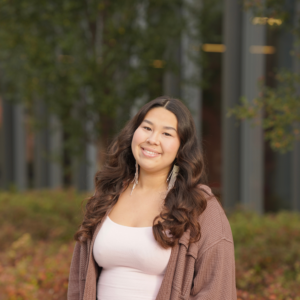
Krissia is Iñupiaq from the Native Village of Point Hope, Alaska. Growing up, she loved living on the coast and seeing the ocean. One summer day, she went to the beach with her cousins and they stuck their feet in the water. They sat there enjoying the cool breeze as their feet were in the crisp water. The ocean was a deep blue, glimmering in the sun. They knew they weren’t supposed to be there alone, and one of their grandmother’s friends saw them and brought them home. She can remember so many experiences of loving her homeland and being outside to enjoy everything about it. She never realized how sensitive her hometown was to climate change until she realized that her people had to move to a new town site due to climate change. They were forced inland due to coastal erosion.
Krissia and her community have lost many things to coastal erosion, including artifacts, homes and cultural sites. As the Alaskan coast continues to erode, she doesn’t feel like anyone is doing anything about it. This is the harsh truth for several Alaska Native villages. Climate change is destroying many homelands, and with it comes the loss of culture and community. Protecting Alaska Native villages and cultures against the loss of our ways of life motivates Krissia to become involved in climate justice. No one should be forced to move away from their homelands – ever.
About Krissia’s Project
During her time as a 2025 Brave Heart Fellow, Krissia created an educational curriculum rooted in climate justice, cultural knowledge and environmental stewardship. Originally from Point Hope, one of the northernmost communities in Alaska, Krissia grew up witnessing the deep impacts of coastal erosion and climate change — from melting permafrost to the loss of traditional ice cellars. These changes threaten not only the land, but the lifeways and food security of her community.
In response, Krissia developed a series of workshops for middle schoolers in her region focused on climate change, coastal erosion and the importance of traditional knowledge. After reflecting on how little of this history was taught to her growing up, she’s returning home to deliver this curriculum and ensure that the next generation understands both the scientific and the cultural context of environmental shifts. Her ultimate goal is to empower Indigenous youth to be informed stewards of their homelands and to protect the future of Arctic communities through intergenerational education.

